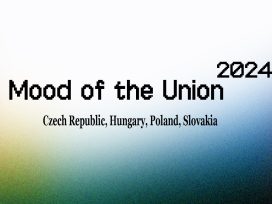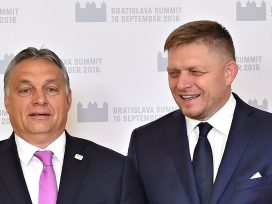1
For some weeks now I have been haunted by a scene in Italo Svevo’s Zeno’s Conscience. Zeno, the eponymous protagonist, devoted to Miss Ada Malfenti asks for her hand in marriage and is rejected. Zeno has a second go that same evening, and tries to persuade another Miss Malfenti of the depth of his feelings. He is rejected once again. Panic-stricken after his double failure, he turns to the youngest sister, Augusta, who accepts him in the full knowledge that his true affection is for Ada.
Serbia’s current political elite seems to be playing out that same Svevo novel scene, with the difference that in their case the confusion is compounded. It’s rather like a passionate Balkan masked ball in which it is impossible to tell who is the suitor and who are the brides-to-be. Only one thing is for sure: unexpected twists lie ahead for the bizarre coalition forged in July 2008, including adulteries and divorces.
Since the May 1988 elections there has been much talk of mysterious trysts and secret deals. Prospects for the most preposterous coalitions have been floated. Ideological programmes belong to the past; the campaigning has long been consigned to the mists of oblivion, it no longer matters who promised what. The Democratic Party caused no little stir by announcing that it would be forming a government with the Serbian Socialist Party. According to Boris Tadic, the party’s leader, the Socialists were worthy partners. Both parties have recently deceased leaders who are still grieved over: the Democrats have Zoran Djindjic, the Socialists – Slobodan Milosevic. The time had come for national reconciliation. The argument, as put by Tadic, who is leader of the Democratic Party as well as the current President of the Republic, is that Milosevic’s party held power throughout the Nineties, while since 2000 everything has shifted to the control of the Democrats, with the end result being that a government of national unity is now needed. The unexpected announcement may have astonished even the most loyal party members, but it is not unprecedented. The beguiling spectre of national reconciliation is haunting the whole of Eastern Europe. István Bibó’s post-war precept about the great trauma that had been suffered by the little nations of the region has nowadays again become highly topical. Following the regime changes, Claudio Magris commented that “the freedom that has been gained across Europe is mixed with snarling hatred and aggressive nationalism.” Nothing out of the ordinary had happened, however; it was just that old sores had been reopened. The new remedy is to assuage fear and loathing of others through national unity. In a multi-party system, however, national unity is a precarious beast. The newly gained freedom has bred a sense of trauma, that of the lack of national unity. Barely has the multi-party system taken root and new dreams are being woven about how to restore it. Frustration is erupting with elemental force even in countries that have entered the European Union. The nationalist right may accept the multi-party system but will not abandon its dreams of national unity.
This is the play that is being staged in politics today in Serbia too. Meanwhile, no doubt just for the sake of killing time, in the intervals the Socialists go round accusing the Democrats of being the gravediggers of Slobodan Milosevic, to which the Democrats retort that the Socialists for their part were the assassins of Zoran Djindjic. Over the graves of the former party leaders one coalition deal after another is being struck, each more absurd than the last, and meanwhile the EU’s foreign ministers, meeting in Brussels or somewhere else, raise glasses of champagne to celebrate the idea that in Serbia, according to the results of the most recent elections, the European option won out. They feign to overlook the minor blemish that, possibly, the new government that emerges may be formed in cahoots with Milosevic’s party, the Serbian Socialist Party. Europe won, did it? Inevitably, an article by Mile Lasic comes to mind that I read recently in Helsinska Povelje, the periodical of the Belgrade Helsinki Committee for Human Rights in Serbia, to the effect that Europe itself is becoming Balkanised.
Europe went on licking and tending to Serbia’s wounds to the point that it fell sick itself. Either the original diagnosis was wrong, or the treatment that was adopted was inadequate.
The row continues. The central figures are dissimulating. The booty is shared out before the post-election spree comes to an end. The masqueraders, however, are irritating a substantial portion of the populace. They are watching the antics in disbelief, because the very people who only yesterday were accusing each other of high treason and betrayal are today feasting on the lamb together. They differ from the politicians of the Hungarians in the Vojvodina in that the latter, of course, regarding each party as a bunch of traitors, are unwilling even to sit down at the same table with them.
2
The Bosnian writer Dzevad Karahasan is waiting with a huge umbrella on the
S-Bahn platform at Savigny Platz. In eastern Berlin where I have come from, there wasn’t even a sign of rain, while here in the west it has been pouring for hours. It’s not unusual, he says; there were even times when it snowed heavily in East Berlin but not a single snowflake fell in the West, explaining it all as if he were himself a born Berliner. He is one of the East-Central European writers who now consider Berlin their second home. I’m not talking about dissidents or refugees, but about writers who long to have two homes or they simply do not feel too good at home. It’s not dictatorship they are fleeing now but the new democratic order. This gives pause for thought now that those countries are either already member states of the EU, or else heading that way. In the Eighties the intelligentsia was the motor of change, whereas now their complaint is more likely to be that they did not have these sorts of changes in mind; the transformation to democracy has got onto the wrong track. Anyone who can is fleeing from the capitalist free-for-all of the new Eastern Europe and either withdrawing into internal exile, even though no-one is forcing them to do so, or else pretending to be unaware of where they are living.
Karahasan and I had not met for years, but we still began talking as if it had been yesterday. In one of the nearby Italian cafés we immediately got onto the subject of Yugoslavia. By now I’ve got used to the fact that any time I meet a Croat, Slovene or Serb writer in Berlin a strange and unaccountable sensation awakens in us and, each and every time, we tell each other stories that have long been well known to us. Those Balkan passions inflicted on us deep traumas that we are unable to rid ourselves of. War capped the history of Yugoslavia’s disintegration; a world fell to pieces but it did not sink. I am reminded of Cioran’s words about the gratifications of being attracted to destruction, the constant inner turmoil of “a bordello going up in flames”.
Dzevad Karahasan feels at home in Berlin because he has become a European nomad, one of many itinerant southern Slav intellectuals. Right now he teaches in Sarajevo, but he lives in Graz and has moved to Berlin for one year. He used to consider himself a Muslim and a Yugoslav European, and he was already attracted to conservatism and the right back in the Sixties. He still holds those views today, and that is what also shines out in his many novels, some of which (Sarajevo: Diary of an Exile, The Book of Gardens, The Eastern Divan, etc.) are now starting to be translated into German and some other languages, though not, as yet, English. Which is precisely why I snatch my head up when he starts lashing out at the neo-nationalists of Sarajevo, the ones who are seeking to rescue Muslimism overnight. Literary life there abounds in people like those, which is why he finds Sarajevo repugnant for all his doom-laden ties to the city. Wherever he may go, it is always important to him to know that Sarajevo exists, and he has no intention of leaving the place forever. But the “nationalist heroes” get on his nerves. The class warriors who were the literary dilettantes of a few decades ago have today become career nationalists, he gripes.
I do my best to console and encourage him. Right-wing intellectuals are going to have to endure the same ordeal that left-wing intellectuals have already undergone and watch how the ideas that they stood for in all sincerity and out of deeply held conviction over many years have been perverted. Just as four decades ago the bulk of youth in the West was on the left, and the influence of their ’68 experiences remains important to the present day, so rightist thinking became fashionable among young people in the eastern part of Europe after the changes of regime at the end of the Eighties and the early Nineties. Leftist illusions were supplanted by rightist illusions.
3
As I watched helplessly from my home on one of Novi Sad’s main boulevards while the Serbian tanks sent against Croatia were paraded in 1991 I realised that Yugoslavia was bound to disintegrate. A decade before I still harboured certain illusions, not surprisingly, as for very many of us across Yugoslavia the conjuncture of Mediterranean, Central European and Balkan cultures with their wonderful diversity was an exciting intellectual challenge, a European venture. It promised to be an exhilarating European experiment that, culturally speaking, was full of potential. Politically, though, it was untenable. When it came to implementing multiculturalism, Yugoslavia was ahead of the West: what we were born into has only been emerging in the West starting with the past two decades. Thanks to a scholarship from DAAD, the German Academic Exchange Service, I spent a year in Berlin, from May 2007 to May 2008, in the course of which those old memories of Yugoslavia all of a sudden reawakened. Berlin, that multicultural megalopolis, the receiving party, brought to my mind a Novi Sad that is now in the process of disappearing. Not that the symptom is specific to Novi Sad; it is East-Central European and Balkan too. While the western megalopolises of London, Berlin and Paris become ethnically ever more diverse, the formerly nationally motley small cities of the East are turning ethnically homogeneous. And that is being done in full view of the EU. The West has entered the post-national age whereas the East has tumbled into a nationalist euphoria.
During the nineteenth century, and right up to the end of the First World War, Hungary also enjoyed the same sort of ethnically variegated life as Yugoslavia did in the latter half of the twentieth century. It was an ethnically mixed and culturally rich country right up to the end of the First World War, but the Peace Treaty of Trianon led to the loss of two thirds of its territory, and with that the flavour of the “foreign”, the “Other”, almost vanished from Hungarian literature. And that goes not only for Hungarian literature, because the ethnic make-up of Eastern European fiction is everywhere becoming monochrome. By contrast, the “foreign”, the “Other”, is finding itself increasingly more at home in western literatures – English, German, French and Austrian – and, little by little, primarily thanks to the great western megalopolises, a new literary Babylon is taking shape.
The old Yugoslavia used to be an exciting cultural Babylon.
In point of fact, it is only since its disintegration that I really started to understand the writer Joseph Roth’s sense of homelessness and statelessness following the dissolution of the Austro-Hungarian Empire. And Robert Musil’s, too, who called himself the sort of Austro-Hungarian from whom the Hungarian would have to be subtracted.
In Vojvodina that subtraction and addition was not just politics or culture but a way of life. In the eighteenth century, after the Ottoman power was driven out, the Empress Maria Theresa of Austria swung into a massive colonisation drive to create what was, in effect, a mini America in the middle of Europe. It was Serbs, Germans and Hungarians, first and foremost, who settled, but there were also substantial numbers of Jews, Slovaks, Romanians and Ruthenians, and in the Banat a few small Spanish colonies also came into existence. Austria-Hungary was an empire and not a nation-state, and the various ethnic groups that settled in the vacuum that was Vojvodina preserved their national distinctions. The inhabitants of Vojvodina were caught up in a particularly absurd process of addition and subtraction, and even more complex mathematical operations were in play. Nobody now mourns the loss of the old Yugoslavia because of the brutality and bloodiness of its break-up. There are many who are willing to say that it was brought into this world as a result of French foreign policy; others suspect that it was a fictional entity dreamed up by the Communist Tito, who had spent his early years growing up in a thoroughly Austro-Hungarian milieu. Whatever may have been the case, the concoction resulted in valuable experiences all the same. Now that Yugoslavia has collapsed I read The Man Without Qualities differently from the way I read it in the Sixties. Then I considered it a great ground-breaking novel; only now do I see that its grand formal experiment was a better expression of the times than were literary works that it is customary to call realist. Realism may be true to perfection but it is insensitive to cataclysms.
4
From the standpoint of the Hungarian minority in Serbia, this year’s elections have had a very instructive legacy. This is a minority that has managed to survive the great ethnic cataclysms in the Balkans. Following the end of the Second World War the ethnic Germans were dispatched to what amounted to death camps or expelled from Vojvodina. The number of Jews had been reduced to a fraction of the pre-war figure. Then the province’s Croat population was halved during the course of the most recent round of Balkan conflicts. The total number of the others – Slovaks, Romanians, Ruthenians, etc. – runs to around 50,000 and so is of little consequence. The last remaining memorial to the Austro-Hungarian Monarchy, the multicultural dominion created by Maria Theresa, is living through its last days. Europe will be the poorer for losing another multinational region. The present total of close to 300,000 who make up the Hungarian ethnic minority is now in rapid decline, with many of the young having fled during the wars because they had not the slightest wish to fight against either Croats or Bosnians or Albanians: they had no wish to have any part in tearing Yugoslavia apart, and as a result they have had to pay a very heavy price.
Over the past ten years the ethnic Hungarians in Serbia have decided either not to vote in elections, or to cast their votes for one of the national parties. As a result, there has been a dramatic fall in the ballot for the minority parties, and the political leadership of the Hungarian minority has lost any significance they may have had. Financial transfusions from Hungary have lent a measure of artificial life-support, it is true, but that has proved to be a disincentive, because the minority’s politicians were not forced into pushing in the wider Serbian political arena for the minority’s rights and the funding that goes with them. They have been content to wait to be bailed out for their own negligence by the mother country. The crisis of confidence reached a peak at the general election in 2007, when out of the 240,000 ethnic Hungarians who were entitled to a vote a mere 50,000 or so voted for one of the minority parties. And that was despite Viktor Orbán, leader of Hungary’s centre-right Fidesz–Hungarian Civic Alliance, turning up in person in Vojvodina to urge the ethnic Hungarians to vote for their own parties. They paid no attention, and in the second round of voting even fewer bothered to go to the polling stations. The story was the same at the extraordinary parliamentary election that was called later last year. Orbán campaigned very vigorously – and professionally, too, I might add – in Subotica and Temerin, but in both the Hungarian minority party suffered an even greater defeat than had been predicted. Subotica is lost, was the despondent exclamation of one of the minority politicians after being crushed by the Democratic Party. On the evidence of the figures, a substantial proportion of the Hungarian minority’s electorate must have voted for the Democratic Party, which has its headquarters in Belgrade.
Many people were surprised that so many of Vojvodina’s Hungarians did not listen to Orbán, because the Fidesz leader is undoubtedly very popular amongst the Hungarian middle class here. However, one cannot put this down to any actions on Orbán’s part. If one is to have any hope of understanding the phenomenon, one needs to bear in mind the important fact that members of minorities often vote for liberal parties in their countries of residence, but they are supporters of right-wing nationalists in the mother country. That is true, for example, in the case of Serbia’s Croat minority, who have dual citizenship, choosing to live in Serbia but entitled to a vote in elections in Croatia. In Croatian elections they vote for the nationalist radicals or right wing, in other words for the Croatian Democratic Alliance (HDZ) founded by Franjo Tudjman in 1991, but in Serbia they pick more moderate candidates. Bosnian Croats are a minority who hold the balance of power between the Croat “Left-Libs” and the Croat “nationalists”, so they decide which direction Croatia will take, but back in Bosnia they side with the liberal parties. Serbian citizens who belong to the Croat minority, or indeed ethnic Serbs who fled from Croatia in the early 1990s and have meanwhile gained Serbian citizenship but still retain their Croatian citizenship, behave in much the same way. Unlike the Croats of Vojvodina, in Croatian elections they do not vote for the Croatian right but for left or liberal candidates, whereas in Serbia they support the Serbian right.
It is the same with the ethnic Hungarians of Vojvodina, voting for the more liberal, Belgrade-based parties in Serbia but unconditionally supporting the right when it comes to Hungary itself. Admittedly, they have no electoral rights in Hungary, but they still make their presence felt at demonstrations run by the Hungarian extreme right, where they can be relied on to pitch in with the rallying cry “We’re with you!” It’s a paradox that carries a strange lesson. I am reminded of the savage in the joke who is asked what he thinks is the worst thing in the world and to be disapproved of most. He replies, when an outside tribe lays waste to our tents and makes away with our women. So what is the best thing? When we lay waste to the tents of the neighbouring tribe and make away with their women. We are the same with liberalism or multiculturalism and Europe’s party politics. We do not like them in our own backyard but are happy enough to offer them to our neighbours, comforting ourselves with the thought that our neighbours do exactly the same. The neighbours can be liberal or multicultural as they like, but we stand for national purity and unity.
5
I’m in the midst of packing. In a few days I shall be back in Vojvodina. I read that Vladimir Putin has been made an honorary citizen of Novi Sad. I have no idea how many Serbian cities have made him an honorary citizen – maybe twenty. The country simply slathers in its cult worship of Putin. Many people put that down to the fact that the Russian leader took Serbia’s side on the issue of the status of Kosovo, and in the UN Security Council Russia vetoed Western proposals to recognise the independence of Kosovo under appropriate controls, but I personally do not think it is just that. Others believe it has to do with the interlacing ties of the Orthodox faith for, let’s be clear about it, an Orthodox Europe does exist. In much the same way, there is also a third connecting link. In Eastern Europe one discerns the emergent outlines of a distinctive capitalist model that one may call the Eastern Way. Some countries have already set off on that path; others are still hesitating; and there are yet others in which the forces for taking that route are still just gathering strength. For them the devout nationalist ex-KGB man Putin has fashioned a model that may well be alluring not just for Serbs but right across the whole of Eastern Europe, one that is far more alluring than socialism. But who talks about socialism nowadays? The nation is at issue, not the class war. Or to put it another way, a person may be pro-Putin even if they have no great liking for the man or for Russians. Many a (Slovak, Romanian, Hungarian, Czech, Serb, Croat etc.) little East European may be stoutly anti-Communist, but is still, half-unaware, dreaming of a kind of Putin.






